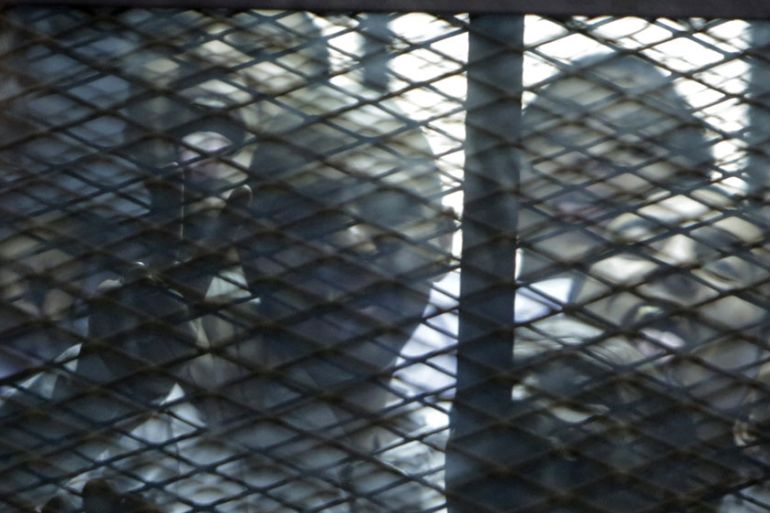Amnesty: Political prisoners in Egypt suffer solitary confinement
Journalists, rights activists and opposition activists often detained with no reasonable charges, UK-based group says.

Authorities in Egypt are deliberately using solitary confinement to punish political prisoners, a new report by Amnesty International says.
Egypt is known to have terrible conditions within its prisons but political prisoners are the ones to frequently get solitary confinement treatment for merely being peacefully politically active, according to the report.
Keep reading
list of 4 itemsMasked Tunisian police arrest prominent lawyer for media comments
Gaza’s mass graves: Is the truth being uncovered?
Tunisia: The migration trap
“Under international law, solitary confinement may only be used as a disciplinary measure of last resort, but the Egyptian authorities are using it as a horrifying ‘extra’ punishment for political prisoners,” said Najia Bounaim, the North African campaign director of the London-based human rights group.
“Amnesty International has documented 36 cases of prisoners being held in prolonged and indefinite solitary confinement, six of them are unlawfully isolated from the outside world since 2013.”
Many journalists, human rights activists and members of the opposition are being detained with no reasonable charges and are being placed on protracted solitary confinement with no definite date for release.
The prisoners undergo physical abuse, receiving harsh beatings by the prison guards on a daily basis, such as getting their heads plunged in human faeces.
‘Similar to a grave’
Furthermore, prisoners rarely receive a sufficient amount of food and water which could result in fatigue and dehydration. The living conditions are also unsanitary.
Hussein Baumi, an Egypt campaigner at Amnesty, told Al Jazeera that one political prisoner, identified only as Hisham, described the cells he was forced into as “similar to a grave”.
Furthermore, Egyptian prison officials use solitary confinement and physical abuse with intentions to get the detained to confess and leak out information.
Psychological torture is also rife as prisoners are pressured into making a confession after their well-being is used as a threat by prison guards.
|
|
Depression, insomnia and an inability to socialise are the effects of being placed in solitary confinement.
Physical and mental abuse affects those imprisoned in a way they develop paranoia, panic attacks and problems with their memory and concentration, says the Amnesty International report.
Political prisoners also develop hypersensitivity to stimuli.
Egypt’s response
Last week, Egyptian authorities sent Amnesty International their response after receiving an advance copy of the report.
The authorities responded by arguing that their placement of political prisons in individual cells does not equate to solitary confinement, and blamed the structure of the prisons for the condition of the cells in which the prisoners are being held.
Yet prisoners suffer by being kept in individual cells for more than 22 hours a day, which Amnesty regards as prolonged solitary confinement and equal to torture, illegal under international law.
Mahmoud Hussein, an Al Jazeera journalist, is one example of prisoners being kept in solitary confinement in an Egyptian jail.
He was detained without charge by the authorities in 2016 during a holiday in Cairo; more than 500 days later, he has yet to be formally charged.
Al Jazeera has repeatedly called on Egypt to release Hussein and other journalists who are being held captive in prisons.